Understand Your Opportunities In Dubai
Starting a small business from home in Dubai can feel both exciting and daunting. But when you realize the potential in this fast-paced city, you’ll see that it’s well worth the effort. Dubai is known for its business-friendly environment, which includes minimal tax burdens and a multicultural market that’s hungry for new ideas. If you’re eager to turn your entrepreneurial spark into a thriving home-based venture, this guide will walk you through each step in clear, manageable terms.
Why Dubai Is Ideal For Home-Based Ventures
Setting up a home business here comes with unique perks. You benefit from world-class infrastructure, easy access to global markets, and a government that’s pushing hard for innovation and small enterprise development. Even if you’re working from your spare bedroom, you’ll still be bridging international gaps with sound digital tools.
Why Dubai Is Ideal For Home-Based Ventures
Setting up a home business here comes with unique perks. You benefit from world-class infrastructure, easy access to global markets, and a government that’s pushing hard for innovation and small enterprise development. Even if you’re working from your spare bedroom, you’ll still be bridging international gaps with sound digital tools.
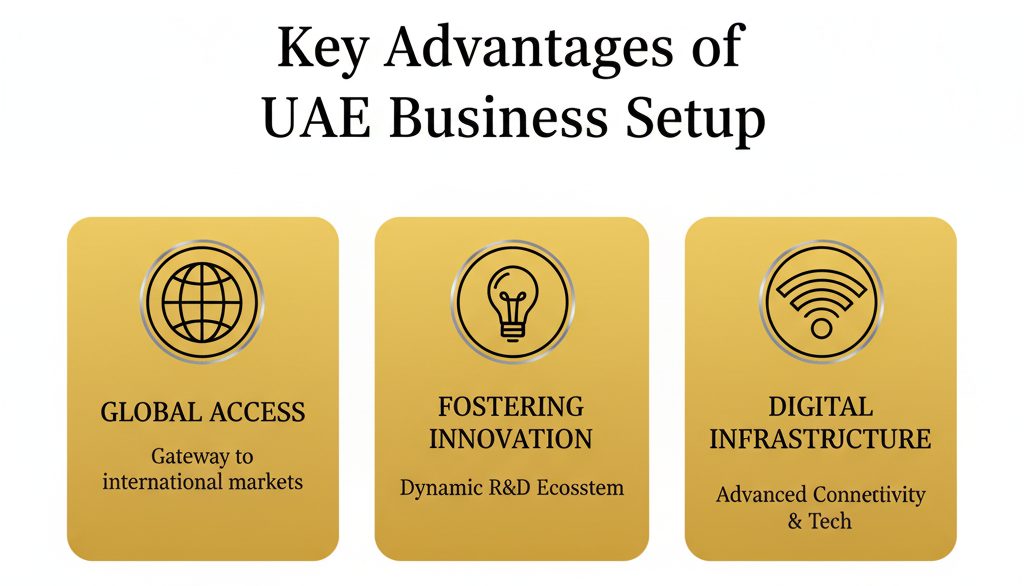
Local Regulations At A Glance
However, Dubai is not a place to dive in without doing your research first. You’ll need licensing, a clear sense of what kind of activities are allowed, and an understanding of broader rules around foreign ownership. If you’re unsure about where to begin, you’re not alone countless entrepreneurs ask themselves how to handle these legalities each year.
Choose The Right Business Structure
One of your first major tasks is deciding how you’ll structure your company. Will you operate under the Mainland system or in a Free Zone? Each route has its pros and cons, and your choice can affect licenses, taxes, and day-to-day operations.
Mainland Vs Free Zone: An Overview
If you register on the Mainland, you can do business across Dubai and the wider UAE. You also have the option to trade internationally. Meanwhile, Free Zones usually let you own 100% of your business, bypassing the restrictive ownership rules of the past. But free zones have specific activity scopes, and some limit you from selling directly within the local UAE market. For a deeper dive, see this guide on mainland vs free zone.
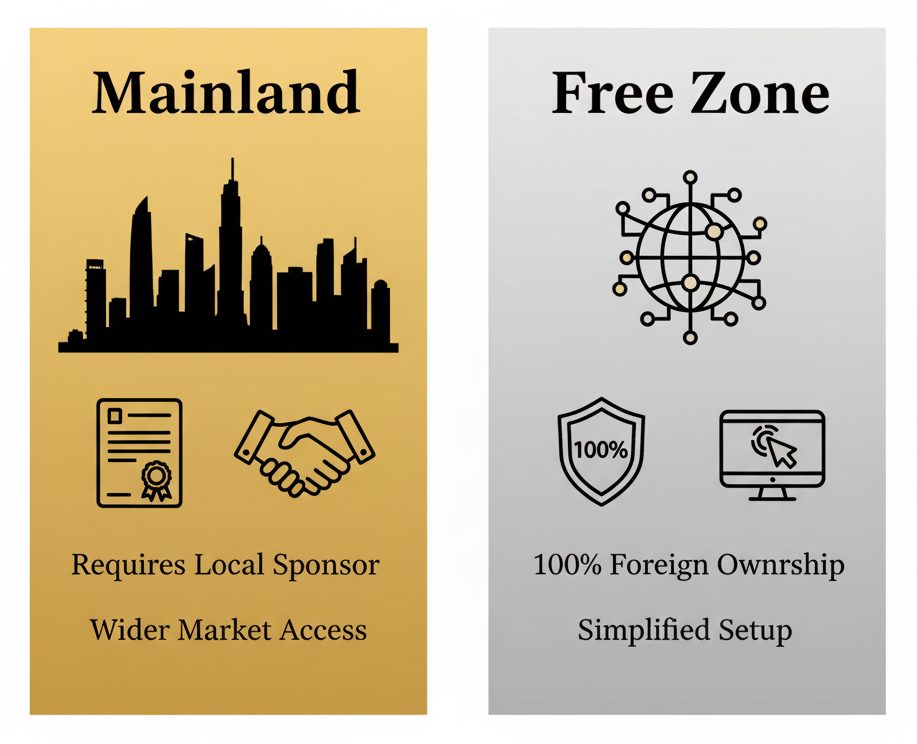
Mainland Basics
- You can trade freely across the UAE.
- You have broader access to government contracts.
- Renewal costs and regulations may vary, so you’ll want to read up on cost of business license in dubai.
Free Zone Basics
- You’re entitled to 100% foreign ownership in most free zones, which is a plus for many global investors.
- Paperwork can be simpler, especially if you’re offering services online.
- However, to sell goods or services in the local market, you might need a local distributor.
Obtain The Necessary License
Licensing is non-negotiable in Dubai. You can’t just start a small business from home in Dubai without getting an official go-ahead. The exact license you need depends on the nature of your venture, whether you’re offering consulting services, selling products, or hosting online workshops.
Commercial License
A commercial license covers the buying and selling of goods. If you’re planning to run an e-commerce store from the comfort of your desk, this license is critical. You’ll still need to follow rules for storage, labeling, and distribution, so keep an eye on compliance. For more insights into the range of permits available, check out types of business licenses in the uae.
Professional License
If your work is more service-based like design consulting, freelancing, or marketing then a professional license is likely your best fit. This license typically has fewer red-tape restrictions, making it popular among solo entrepreneurs.
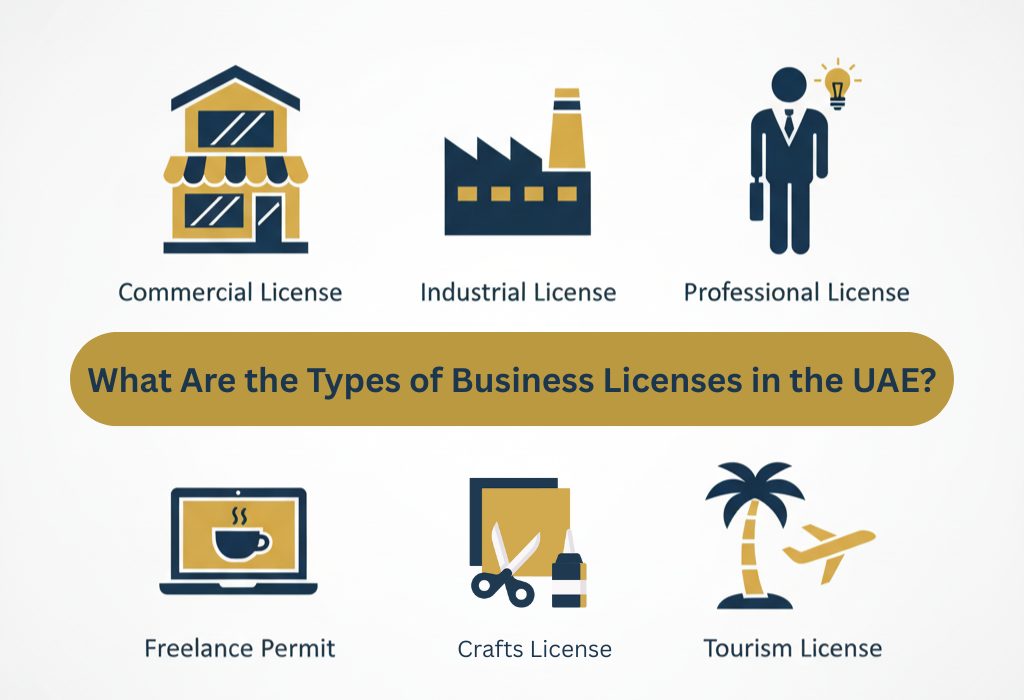
Home Office Requirements
Even if you’re working at home, there could be specific guidelines about how your workspace must be set up. Certain Free Zones have requirements related to renting a desk in a coworking space. On the Mainland side, you might need to show proof of a physical location. If you’re looking to minimize overhead costs, ask about business without an office in the uae.
Complete The Registration Steps
Once you know how you want to structure your company and what license you’ll need, it’s time to get into the nitty-gritty of registration. The entire process can be smooth if you prepare your documents ahead of time.
Reserve A Company Name
Dubai’s authorities want business names that match certain rules. For instance, your company name shouldn’t contain any offensive terms, and it shouldn’t replicate major brands. Brainstorm a few options, then double-check their availability. Names usually go through a quick approval process, but it helps to have backups.
Prepare Your Documents
Commonly required documents include copies of your passport, a summary of your planned activity, and sometimes a no-objection letter if you’re already employed in the UAE. You might also need a brief business plan for a uae company. Keeping these ready speeds up registration significantly.
Apply For Initial Approvals
After you’ve reserved your company name and gathered your documents, you’ll apply for initial government approvals. Think of this as a “green light” to go ahead with the remaining steps. At this stage, you’ll find out if you need to tweak your proposed activities or shift your business structure.
Secure Your Finances
Running a small business from home doesn’t mean your finances are small-time. By sorting out your finances early, you’ll avoid future hiccups. For instance, opening a corporate bank account can be a headache if you wait until the last minute.
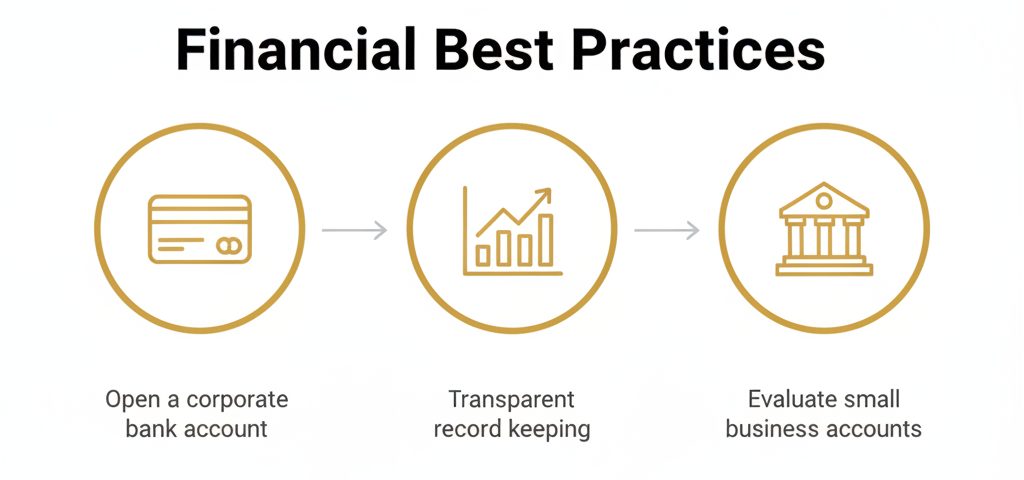
Corporate Banking Essentials
You’ll want a bank account dedicated to your business transactions. This keeps your personal funds separate and simplifies taxes, accounting, and audits later. If you’re wondering how to pick the right bank, consider location, customer service, and any special perks for small businesses. Have a look at corporate banking to see typical services on offer.
Tips For Smooth Banking
- Compile your official registration documents before walking into any bank.
- Maintain transparent records of all transactions so you can build credibility.
- Evaluate special small-business accounts to see if you can benefit from lower fees or value-added resources.
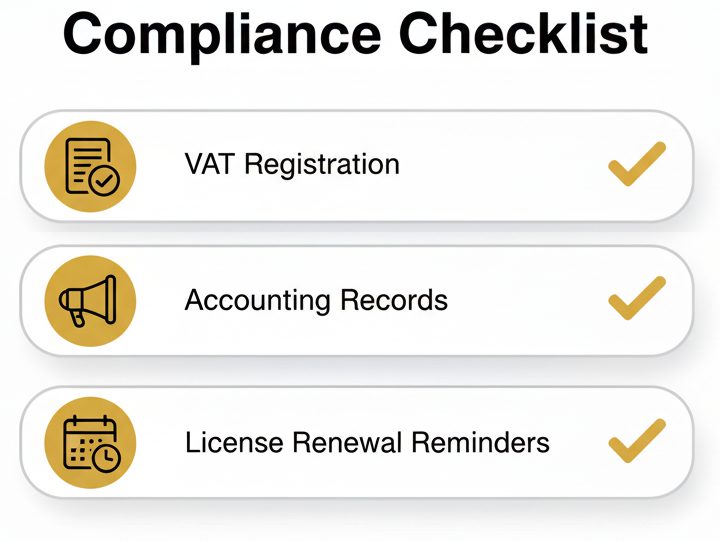
Stay Compliant With Regulations
Compliance is crucial. Even if you’re operating from your kitchen table, you still need to follow local laws. Regulations cover everything from tax filings to data protection, so don’t skip this part.
Register For Taxes
The UAE continues evolving its tax framework. If you run a commercial or professional activity, you might be subject to value-added tax (VAT). In some cases, certain profits are taxed, while others are not. For expert guidance as regulations change, you can lean on tax consultancy. Understanding your obligations upfront prevents surprises down the road.
Maintain Proper Accounting
Detailed bookkeeping is more than a formality. It helps you see trends, measure profitability, and catch any red flags early. Since you’re working from home, it’s easy to blur lines between business and personal expenses. Tools or professionals who specialize in accounting and bookkeeping can keep everything in check.
Renewal Obligations
Business licenses in Dubai typically need to be renewed annually. Set reminders so you don’t forget, then be ready to submit documents by the due date. Remember that late renewals can lead to penalties or, in worst-case scenarios, business suspensions.
Navigate The Pro Services And Legal Support
If you’d rather not juggle deadlines and paperwork on your own, consider professional assistance. Dubai has a market for pro services that tackle everything from licensing renewals to document typing and submission. This support can save you time and reduce the risk of errors.
Additional Help Available
- Compliance services: Ensuring your home-based enterprise consistently meets regulatory requirements.
- Concierge services: Handling errands, scheduling official appointments, and more.
By investing in these resources early, you’ll have more headspace for strategy and growth rather than getting tangled in administrative knots.
Factor In Possible Costs
Yes, working from home is more budget-friendly than renting a commercial office. But you’ll still encounter paperwork fees, license charges, potential staff salaries, marketing costs, and even tech subscriptions. Before you finalize your strategy, map out a basic financial plan.
Common Expenses
- Licensing Fees: They differ by zone, license type, and your specific activities.
- Setup Fees: Free zones often bundle these into packages.
- Monthly Recurring Costs: Internet, software tools, maintenance, or small inventory if you’re selling physical products.
If you’re bootstrapping, you may want to look into how to start a business with no money. It’s possible to keep expenses small as you gradually scale.
Market Your Home-Based Business
Once you’ve completed the legal setup, you’re ready to spread the word. Whether you’re offering virtual services or shipping products from your living room, marketing is key to getting noticed in a crowded marketplace. Start by identifying who your customers are and how you want to reach them.
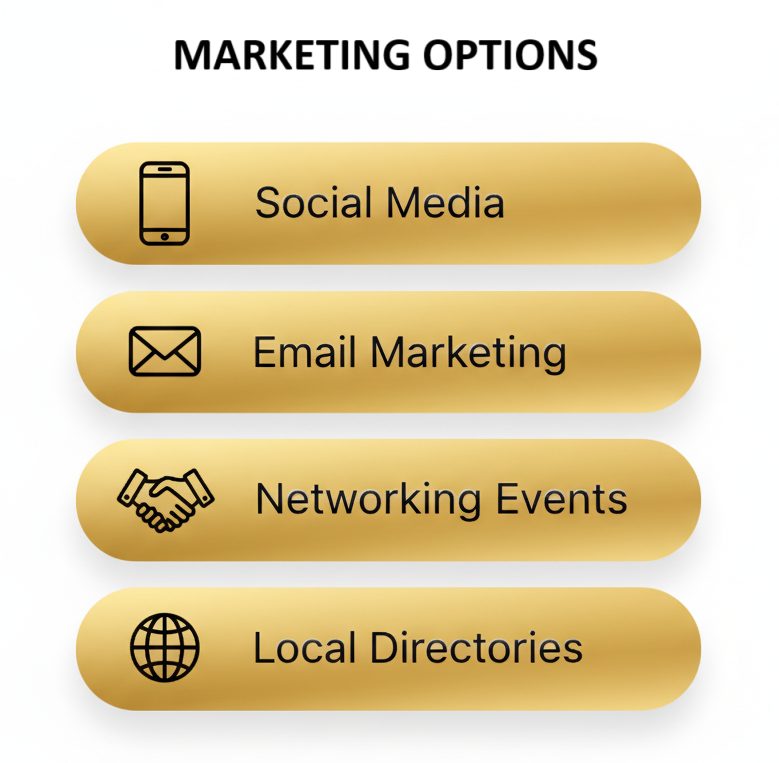
Build An Online Presence
In Dubai, the audience is highly connected. Use social media, a simple website, or even a listing on local business directories to gain visibility. For professional communications, you might want to set up official channels, like a dedicated WhatsApp line or branded email. For pointers, see setup business whatsapp and email.
Leverage Local Communities
Networking events and expos dedicated to small businesses happen regularly in Dubai. They’re often hosted in co-working spaces or within free zones. Even though you’re operating from home, putting yourself out there in person can lead to partnerships and loyal customers.
- Join local Facebook groups or LinkedIn communities.
- Send out introductory emails to potential partners or mentors in your niche.
- Attend fairs where you can present your products or services in a relaxed environment.
Prepare For Long-Term Growth
Succeeding in Dubai goes beyond a single license or marketing plan. You should also think about future growth. Maybe you’ll outgrow your home office and move into a small warehouse or studio. Or you might want to experiment with new product lines that require advanced licensing.
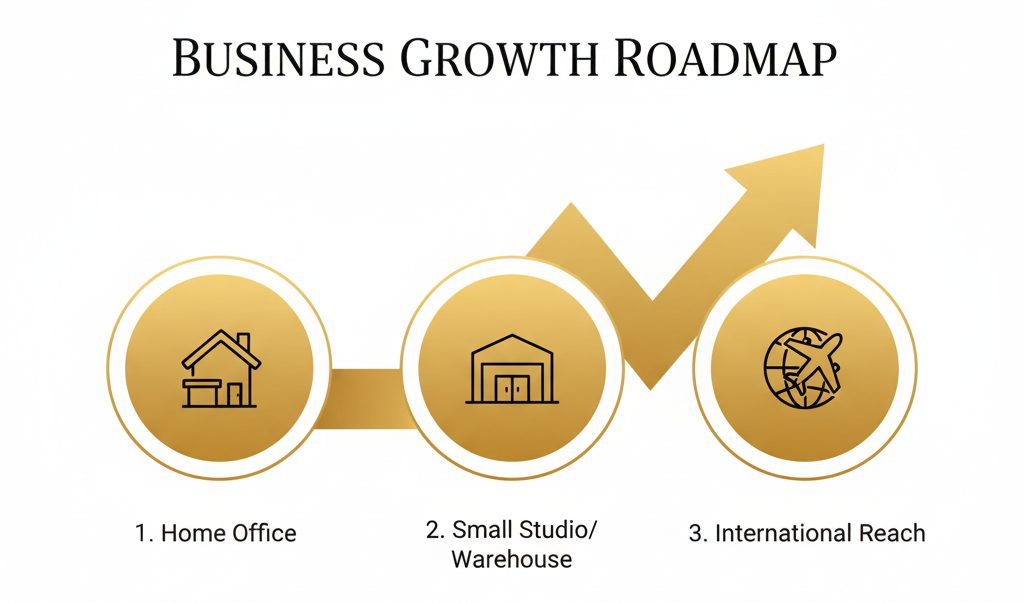
Expand Your Reach
If you decide to sell beyond the UAE, Dubai’s strategic location makes it easy to tap into markets across the Middle East, Africa, and South Asia. That’s a huge advantage. However, each region has its own regulations, so you’ll need to do your homework or consult a professional.
Maintain A Growth Mindset
Every year, reflect on your business model, your finances, and your personal goals. If you see potential to scale, put strategies in place. For bigger expansions, have a look at set up your business for long-term growth. It’s also smart to keep track of changes in local policies so you can adapt fast when new regulations appear.
Manage Risks And Challenges
Even well-planned ventures can face setbacks. The home-based setup might require strong self-discipline, and you’ll also need to handle competition, evolving market trends, or unexpected changes in government regulations. But there are steps you can take to stay resilient.
Legal Hurdles
Be sure you’re aware of the fine print. Are you permitted to store inventory at home? Do you have restrictions on shipping certain products? For complex issues, consult professionals in compliance services who can guide you through new policies and industry-specific regulations.
Financial Risks
Business revenue can fluctuate, especially during early stages. Maintain a financial reserve to address unexpected costs. Keep up with your tax and compliance obligations so you’re never caught off guard. If you’re unsure which expenses are deductible, explore corporate tax deductible vs non deductible.
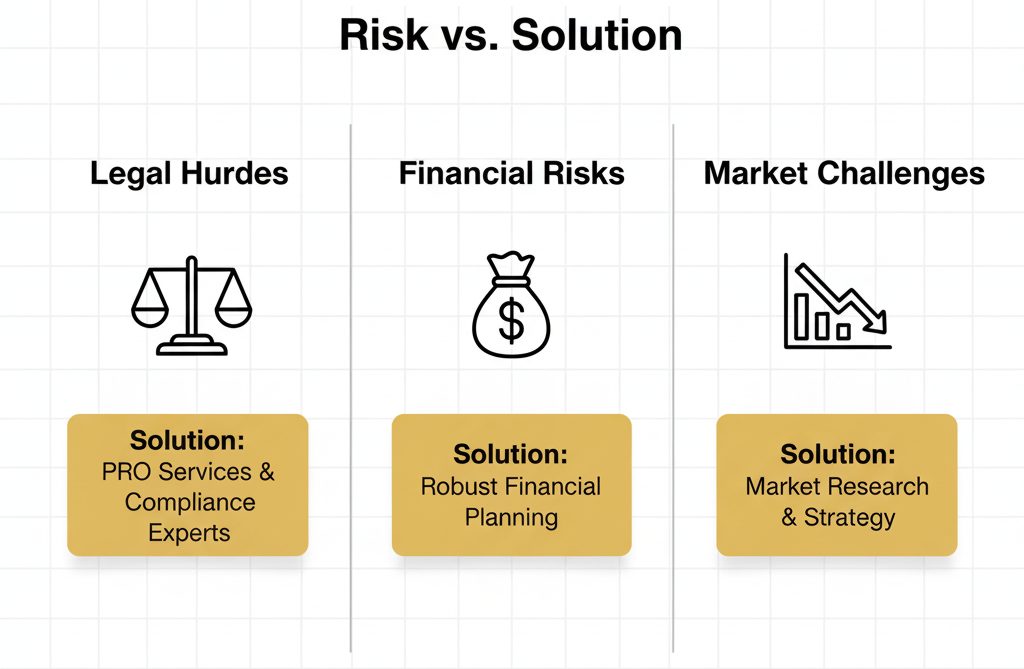
Stay Innovative And Adaptive
Dubai’s business landscape thrives on innovation. Even home businesses can bring fresh ideas to the table like creative marketing campaigns, digital product launches, or unique pivot strategies when the market shifts.
Explore Emerging Opportunities
From tech startups to specialized consulting, new sectors are always popping up in the UAE. If you’re comfortable working with cryptocurrency, you can even investigate setting up a crypto trading business license in the uae. The city prides itself on being quick to adopt future-facing trends.
Keep Improving Your Skills
Working from home doesn’t mean you should stay in isolation. Tap into workshops, webinars, or short courses. Whether it’s digital marketing, e-commerce, or financial management, continuous learning ensures your home-based business remains competitive and relevant.
Final Thoughts And Next Steps
Starting a small business from home in Dubai certainly has its complexities, but you’re in the right place to pursue success. By choosing the right business structure, securing the necessary license, and planning out your finances, you can build a solid foundation. Focus next on marketing, compliance, and continuous growth, so your venture remains both profitable and rewarding.
If you’re still trying to figure out the basics, check out how to setup a business in the uae for even more insights. In Dubai, opportunity really does knock at every door even the one to your home office. So roll up your sleeves, follow these steps, and take that confident leap into your new entrepreneurial journey.
Quiz — Get Expert Help
Would you prefer setting up alone or with expert help?





